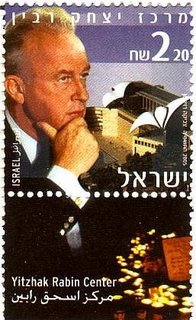Peace Now
 Hope for peace was never higher than on November 4, 1995, when Yitzhak Rabin was gunned down not by a Palestinian terrorist, but by a crazed Israeli fanatic. Today we visited the Yitzhak Rabin Center in Tel Aviv, the first museum established to depict contemporary Israeli society. It is actually a work in progress, designed by Moshe Safdie after a law was passed in January 1997 to establish the center. Built at a cost of $35 million, it will officially open next year.
Hope for peace was never higher than on November 4, 1995, when Yitzhak Rabin was gunned down not by a Palestinian terrorist, but by a crazed Israeli fanatic. Today we visited the Yitzhak Rabin Center in Tel Aviv, the first museum established to depict contemporary Israeli society. It is actually a work in progress, designed by Moshe Safdie after a law was passed in January 1997 to establish the center. Built at a cost of $35 million, it will officially open next year.The young Rabin dreamed of becoming a water engineer in the parched land of Israel. Instead he was drawn into military service with the Six Day War being the highlight of his military career.
After the war he dedicated himself to another battle, where the hope was for a time when there would be no dead and no wounded, the battle for peace. He said that we should not let the land of milk and honey become a land flowing with blood and hate. His focus in life became to support peace.
The Yitzhak Rabin Center when it is completed will focus on education and outreach. It will strive to perpetuate his legacy and to teach the lessons to be learned form his untimely assassination. It will emphasize that democracy is not to be taken lightly. It will examine the threats to the democratic fiber of the State of Israel. The speaker quoted an alarming statistic: 26% of Israelis between the ages of 18 and 25 would support the assassination of any leader who attempts to return the territories to Israel. Is this democracy gone crazy?
It can be said of Rabin that he knew how to lead with integrity. He was deeply admired by Bill Clinton and King Hussein of Jordan, as well as other world leaders.
Just as Americans over the age of 50 remember exactly where they were when John F. Kennedy was assassinated, Israelis will forever remember that day when their hope for peace was shaken with the untimely death of perhaps their greatest statesman.


0 Comments:
Post a Comment
<< Home